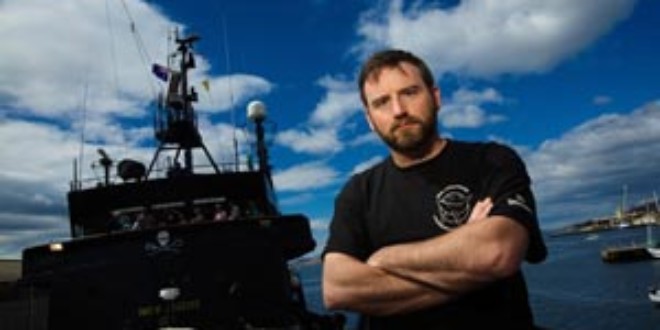Chris Aultman is the helicopter pilot and Aviation Director of the Sea Shepherd Conservation Society. He served for six years in the United States Marine Corps prior to joining the Sea Shepherd team. During that period Chris spent 13 months at sea and became a veteran of the Gulf War.
Aultman’s first experience with the destruction of the world’s oceans was seeing the disastrous effects of the millions of barrels of oil dumped into the Persian Gulf during that war. This and many other experiences caused Chris to start to see the world for what it really was, and nothing was ever the same again.
Many years later, Chris met the founder of Ocean Defenders Alliance, who was tabling for Sea Shepherd Conservation Society at a local scuba show. Already a commercial helicopter pilot and flight instructor, Chris asked if Sea Shepherd ever needed helicopter pilots. This proved to be a very ironic question since it was his involvement with Ocean Defenders Alliance that brought him to meet Captain Paul Watson and become the helicopter pilot for Sea Shepherd.
Chris since has flown during the last three Antarctic Whale Defense campaigns and is ready to return to the worlds oceans for the defense and conservation and marine wildlife.
So, what can we expect to see in the second season of Whale Wars?
The second season of Whale Wars will show that the battle over illegal Japanese whaling has intensified considerably. Luckily for Sea Shepherd, we were prepared for this challenge. We spent the year updating our ship the Steve Irwin and selected one of the best volunteer crews we have ever had.
 Last season’s finale drew over a million viewers. Are you surprised at all by that turnout?
Last season’s finale drew over a million viewers. Are you surprised at all by that turnout?
I always thought that the show would be popular due to the fact that most people would be shocked to learn that commercial whaling still existed. However, I was surprised by the final numbers as well as the attention and support that they have brought to Sea Shepherd.
What’s the most positive thing you’ve gotten out of joining the Sea Shepherd crew?
It has been an honor to be part of a team that works to end illegal acts on the world oceans.
You’re pretty much the “eyes” of the Steve Irwin, how is your experience different than those who spend all of their time on the ship.
I have the privilege of seeing things differently than most crew members do, that is true. I have the best view of any office in the world.
I also have a tremendous amount of responsibility in my job and I take it very seriously. Aside for the personal safety of crew I also have to make sure that the information that I obtain for Captain Watson is correct. If I don’t, then we could sail in the wrong direction and loose the fleet or get trapped behind ice.
Daryl Hannah joins the crew this time around. Did having a celebrity onboard (outside of Captain Paul Watson) change the crew dynamics at all?
We have had many celebrities on board our ships over years. Daryl was great and was well liked by the crew. She quickly became one of the crew and even made dinner for us one evening!
Is she really a mermaid?
Sadly, no.
During the fifth episode of last season you, when the ship docked for repairs, you remained behind due to helicopter corrosion. How difficult was it to make that decision?
This was a necessary decision but it was very difficult for me to inform the Captain that he would be returning without me. We have since solved the corrosion issue by constructing a new heli-deck and hanger on the stern of the Steve Irwin which protects the helicopter.
Are you and the chopper a packaged deal? Could you have continued on with the crew?
I have two jobs at Sea Shepherd: Aviation Director and Campaign Coordinator. Besides being a pilot, I am responsible for the logistical support for our helicopter and the Steve Irwin . When I made the decision to not to return with the helicopter on the second leg of Operation Migaloo, I returned home and supported the ship remotely during the rest of the campaign. I also worked with our maintenance base in Melbourne to get the helicopter ready to return to sea again.
Life on the Steve Irwin looks pretty treacherous flash bombs, crew members taken hostage, and Captain Paul Watson being shot. Is there any part of that experience that doesn’t translate on TV?
I think that the show is accurate in its portrayal of life at sea on board the Steve Irwin. Every moment is not exciting however and we all have our own routines to get us through the slow days. Everyone is different in this regard but we all find a way.
You guys have been called everything from eco-terrorists to pirates in the press. Has your reception by the general public reflected that at all?
The Australian people have been the most supportive by far. It never ceases to amaze me how much support we receive there. That said, we have supporters all over the world that are just as loyal. Without them, we would not be able to go to sea.
When the campaign’s over, what’s the first thing you do when you get home?
I get in my Jeep and go camping in the high desert with my family.
(From planetsave.com, by Jerry James Stone)
 Ocean Sentry
Ocean Sentry




